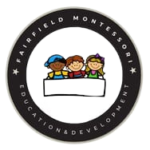What is Montessori
Home >What is Montessori
What is Montessori Education
Montessori Education is an individualized approach to learning, tailored to the unique learning style, developmental stage, and interests of each child. Through hands-on experiences, real-world applications, and problem-solving techniques inherent in the Montessori Method, children establish comprehensive foundations in both academics and well-being.
The Montessori Methods of Education:
Montessori, conceived by Dr. Maria Montessori, stands as an educational approach with a global impact, demonstrating success for over a century. It presents a comprehensive perspective on education as a tool for life’s preparation.
Originally a medical professional, Maria Montessori shifted from the field of medicine to education, inspired by her work with underprivileged children. Utilizing her scientific training, she keenly observed children’s learning processes and applied these insights to revolutionize educational methods, yielding remarkable outcomes.
In 1907, Dr. Maria Montessori inaugurated her inaugural ‘Casa Dei Bambini’ or ‘Children’s House,’ catering to young children not yet eligible for conventional schooling. Within a year of implementing her groundbreaking educational approach, many students achieved proficiency in reading, writing, and basic mathematics. The success of the Montessori Method rapidly spread across Europe and gained global recognition.
A distinctive feature of Montessori is the meticulously prepared environment, also known as the Montessori classroom. Unlike standard childcare centers, it is filled with educational materials intricately linked to children’s needs and interests at specific developmental stages.
Each educational material imparts a targeted learning outcome, progressively enhancing children’s knowledge and skills. Through consistent repetition and practice, children master the five areas of the Montessori Curriculum: Practical Life, Sensorial, Mathematics, Language, and Culture.
In this educational space, Montessori educators play a vital role in observing children’s inclinations and introducing materials aligned with those interests, ensuring purposeful and engaging learning experiences.
Montessori’s effectiveness lies in its acknowledgment of diverse learning styles and paces, meeting children at their individual points of development. It establishes an environment where children enjoy respect, independence, and the freedom to guide their learning journey. This approach fosters high levels of motivation, leading to a genuine love for learning, and children naturally excel in their educational endeavors.
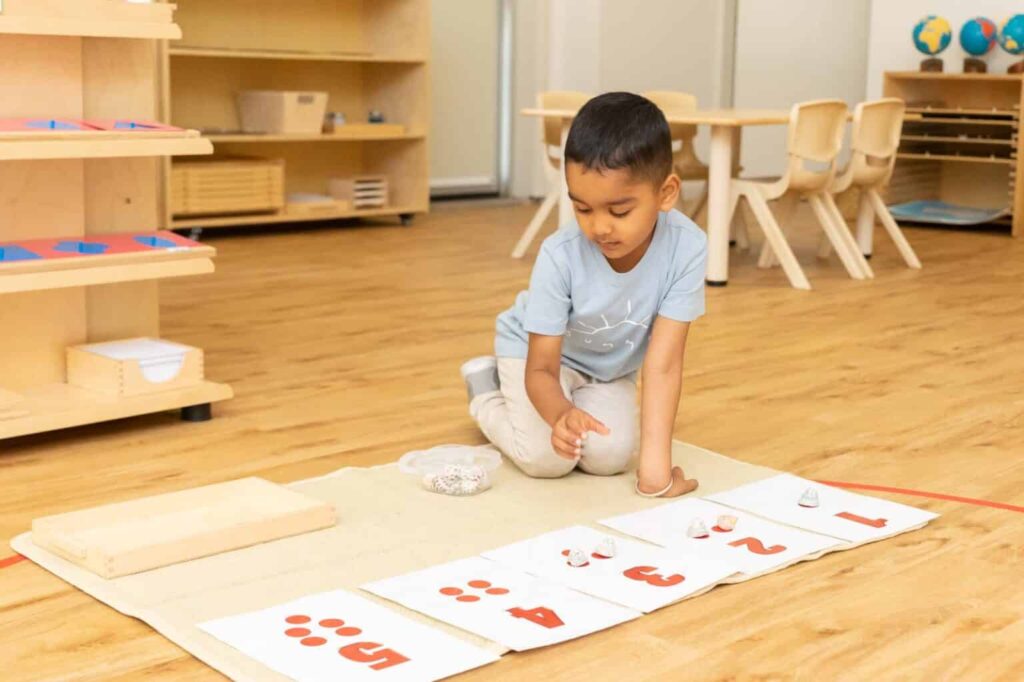
How is Montessori Education Different?
- Personalised Curriculum
- One-on-one lessons
- Flexibility in development
- Learning through hands-on experience
- All learning styles are addressed
- Children make choice and decisions
- Freedom of movement
- Montessori materials make abstract concepts concrete
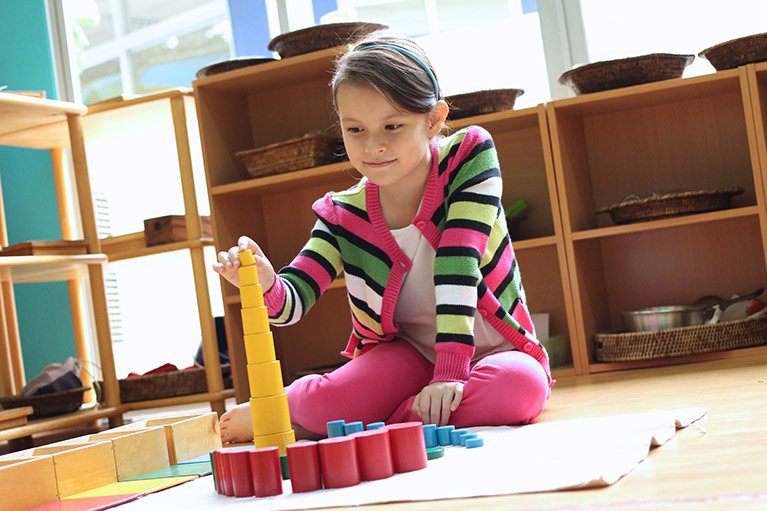
What sets Montessori Education apart?
- Tailored curriculum
- Individualized lessons
- Developmental flexibility
- Recognition of diverse learning styles
- Emphasis on hands-on learning
- Empowerment of children to make choices and decisions
- Freedom of movement
- Montessori materials transforming abstract concepts into tangible experiences
Prepared Learning Environment
Within the Montessori classroom, a meticulously arranged space facilitates purposeful learning, characterized by beauty, order, and accessibility. Child-sized tables, chairs, learning materials, and sinks are strategically placed, while open and accessible shelves encourage exploration. Every element is intentionally designed to foster children’s independence. The Montessori materials within this prepared environment are organized according to their curriculum areas, displayed in a left-to-right progression from easiest to most challenging, providing a logical learning pathway.
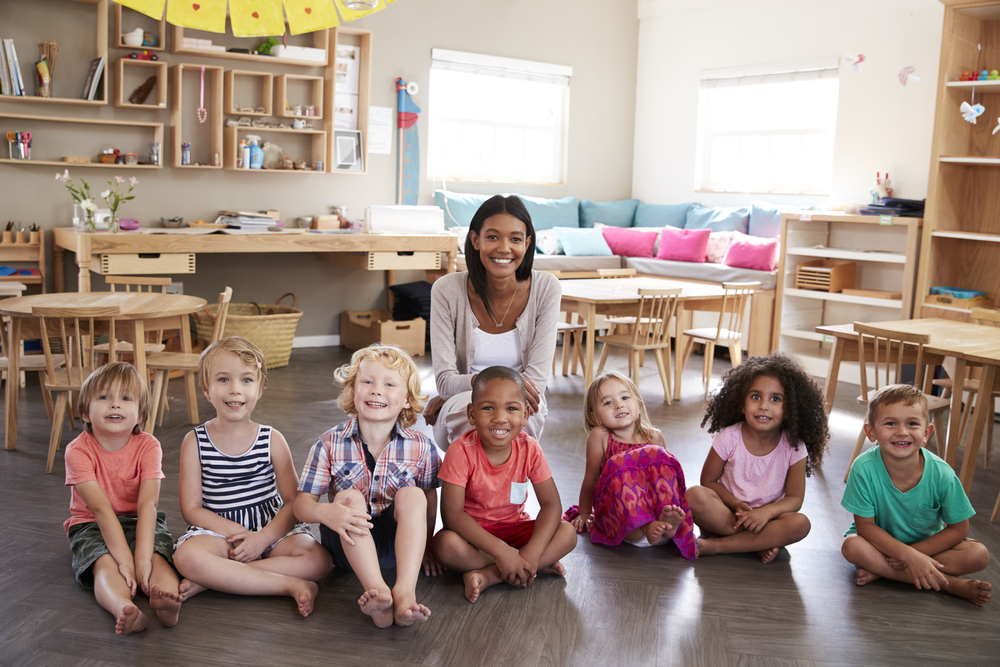

Montessori Learning Tools
Serving as interactive aids, Montessori materials are hands-on tools that lead children to discover essential learning outcomes through repetition and practice. These tools isolate specific concepts or skills and incorporate a built-in control of error, empowering children to recognize and rectify their own mistakes. As children advance through the curriculum, the Montessori materials become more intricate, offering opportunities for extended learning. Mastery of learning outcomes is achieved through repeated practice.
Child-Centered Montessori Curriculum
The Montessori Curriculum is a holistic framework centered around the child’s development, encompassing cognitive, physical, social, and emotional aspects. Comprising five key areas—Practical Life, Sensorial, Language, Mathematics, and Cultural Studies—the curriculum features a sequence of Montessori materials that isolate individual learning outcomes or skills. Progressing through the curriculum enables children to attain a comprehensive understanding of each subject area.

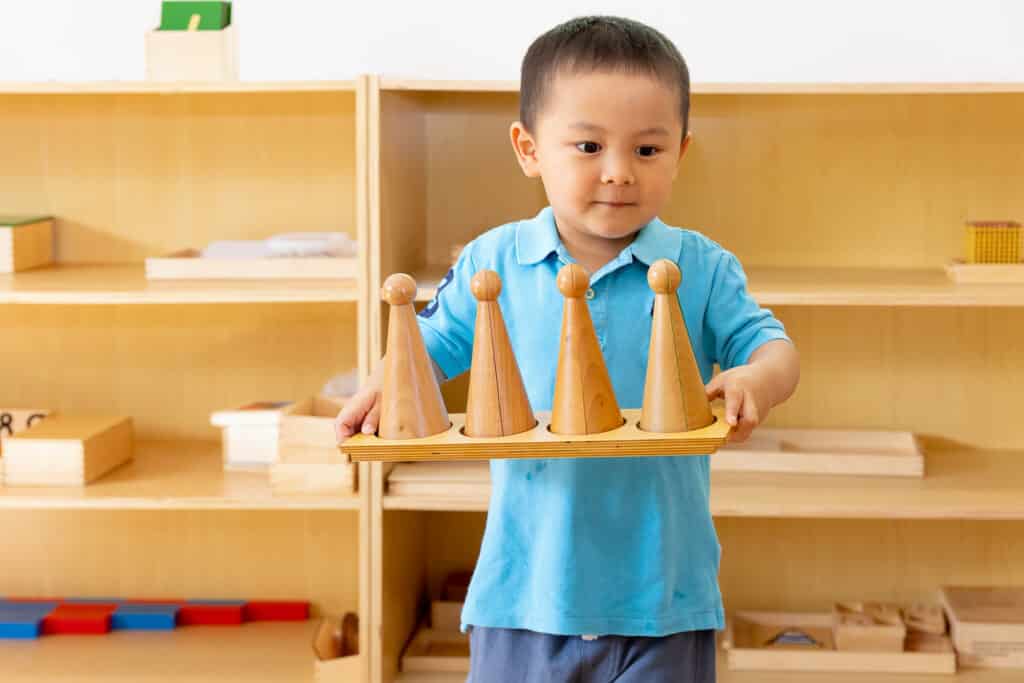
Montessori Principles
Dr. Maria Montessori formulated the guiding principles of Montessori education to establish a framework for effectively nurturing children in their learning journey. These principles are grounded in the belief that children possess inherent intelligence, a natural inclination to learn, and immense potential.
Montessori Educator
The Montessori educator plays a crucial role in observing, monitoring, and guiding each child’s learning development. By keenly observing children’s interests, educators direct them toward activities aligned with their developmental stage, fostering a positive learning environment. Presenting succinct and individualized lessons, educators empower children to discover learning outcomes independently and at their own pace.
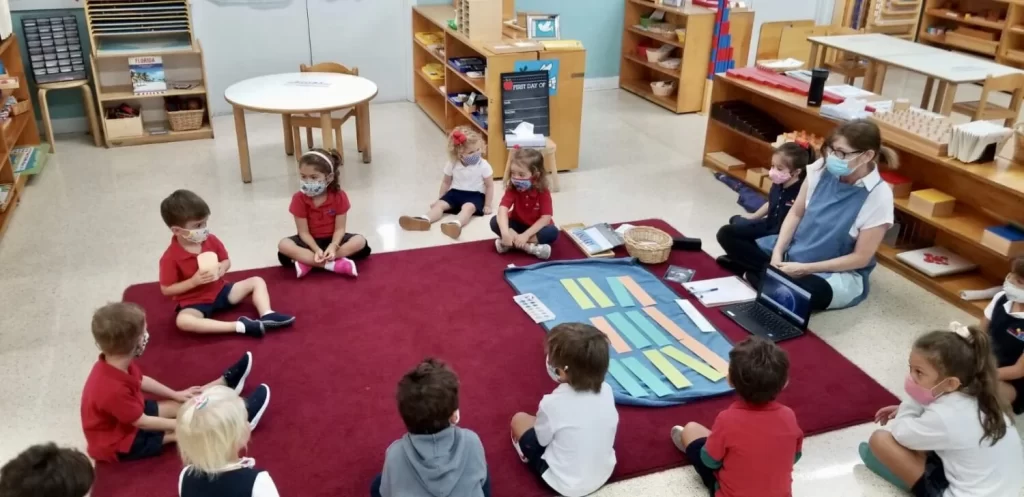
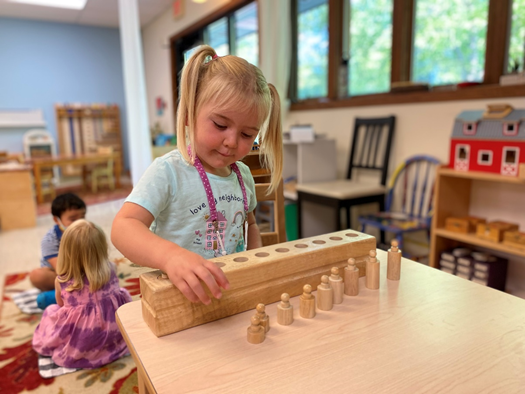
Montessori Work Cycle
During an extended period of “free choice,” children have the freedom to select their tasks and progress at their preferred pace without interruptions. The Montessori work cycle encourages deep engagement with activities, allowing students to pursue their interests and fulfill their need for repetition and practice, ultimately mastering key learning outcomes and skills.
What's Ahead? Montessori Principles
Montessori principles serve as the cornerstone for the Montessori Method of education, delineating the rationale and methodology behind the design of the Montessori Education Program. These principles are derived from Dr. Maria Montessori’s keen observations on the natural learning processes of children, shaping the approach and philosophy that guide Montessori education.

